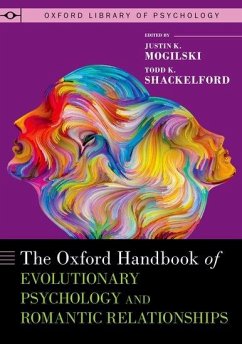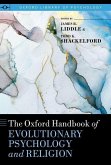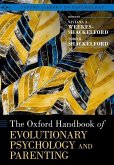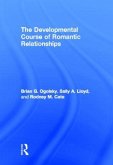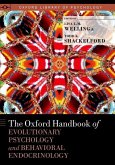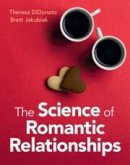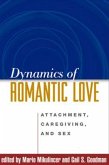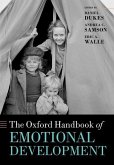Justin K Mogilski, Todd K Shackelford
The Oxford Handbook of Evolutionary Psychology and Romantic Relationships
Justin K Mogilski, Todd K Shackelford
The Oxford Handbook of Evolutionary Psychology and Romantic Relationships
- Gebundenes Buch
- Merkliste
- Auf die Merkliste
- Bewerten Bewerten
- Teilen
- Produkt teilen
- Produkterinnerung
- Produkterinnerung
This handbook showcases the empirical and theoretical advancements produced by the evolutionary study of romantic relationships, tracing evolved psychological mechanisms that shape strategic computation and behavior across the lifespan of a romantic partnership. It discusses popular and cutting-edge methods for data analysis and theory development, critically analyzing the state of evolutionary relationship science and recommendations for future research.
Andere Kunden interessierten sich auch für
![The Oxford Handbook of Evolutionary Psychology and Religion The Oxford Handbook of Evolutionary Psychology and Religion]() James R LiddleThe Oxford Handbook of Evolutionary Psychology and Religion217,99 €
James R LiddleThe Oxford Handbook of Evolutionary Psychology and Religion217,99 €![The Oxford Handbook of Evolutionary Psychology and Parenting The Oxford Handbook of Evolutionary Psychology and Parenting]() The Oxford Handbook of Evolutionary Psychology and Parenting189,99 €
The Oxford Handbook of Evolutionary Psychology and Parenting189,99 €![The Developmental Course of Romantic Relationships The Developmental Course of Romantic Relationships]() Brian G OgolskyThe Developmental Course of Romantic Relationships196,99 €
Brian G OgolskyThe Developmental Course of Romantic Relationships196,99 €![Oxford Handbook of Evolutionary Psychology and Behavioral Endocrinology Oxford Handbook of Evolutionary Psychology and Behavioral Endocrinology]() Oxford Handbook of Evolutionary Psychology and Behavioral Endocrinology217,99 €
Oxford Handbook of Evolutionary Psychology and Behavioral Endocrinology217,99 €![The Science of Romantic Relationships The Science of Romantic Relationships]() Theresa DidonatoThe Science of Romantic Relationships156,99 €
Theresa DidonatoThe Science of Romantic Relationships156,99 €![Dynamics of Romantic Love Dynamics of Romantic Love]() Gail S. Goodman / Mario Mikulincer (eds.)Dynamics of Romantic Love79,99 €
Gail S. Goodman / Mario Mikulincer (eds.)Dynamics of Romantic Love79,99 €![The Oxford Handbook of Emotional Development The Oxford Handbook of Emotional Development]() The Oxford Handbook of Emotional Development183,99 €
The Oxford Handbook of Emotional Development183,99 €-
-
-
This handbook showcases the empirical and theoretical advancements produced by the evolutionary study of romantic relationships, tracing evolved psychological mechanisms that shape strategic computation and behavior across the lifespan of a romantic partnership. It discusses popular and cutting-edge methods for data analysis and theory development, critically analyzing the state of evolutionary relationship science and recommendations for future research.
Hinweis: Dieser Artikel kann nur an eine deutsche Lieferadresse ausgeliefert werden.
Hinweis: Dieser Artikel kann nur an eine deutsche Lieferadresse ausgeliefert werden.
Produktdetails
- Produktdetails
- Verlag: Hurst & Co.
- Seitenzahl: 864
- Erscheinungstermin: 28. Februar 2023
- Englisch
- Abmessung: 262mm x 191mm x 60mm
- Gewicht: 1652g
- ISBN-13: 9780197524718
- ISBN-10: 0197524710
- Artikelnr.: 66153828
- Herstellerkennzeichnung
- Libri GmbH
- Europaallee 1
- 36244 Bad Hersfeld
- gpsr@libri.de
- Verlag: Hurst & Co.
- Seitenzahl: 864
- Erscheinungstermin: 28. Februar 2023
- Englisch
- Abmessung: 262mm x 191mm x 60mm
- Gewicht: 1652g
- ISBN-13: 9780197524718
- ISBN-10: 0197524710
- Artikelnr.: 66153828
- Herstellerkennzeichnung
- Libri GmbH
- Europaallee 1
- 36244 Bad Hersfeld
- gpsr@libri.de
Justin K. Mogilski earned his Ph.D. in evolutionary psychology from Oakland University in 2017. He is an Assistant Professor at the University of South Carolina, Salkehatchie. He researches how evolution has shaped brain computation to adaptively guide the decisions that people make to initiate, maintain, and dissolve intimate relationships. He has published evolutionary, social, personality, and sexual psychology journals on topics spanning mate poaching, infidelity, cross-gender friendship, intimate partner conflict, moral decision-making, morphometric cues of partner attractiveness, and multivariate statistical analyses of human mate preference. Todd K. Shackelford received his Ph.D. in evolutionary psychology from the University of Texas at Austin in 1997. Since 2010, he is Professor and Chair of the Department of Psychology at Oakland University in Rochester, Michigan. Shackelford has published around 400 journal articles and his work has been cited around 28,000 times. Much of Shackelford's research addresses sexual conflict between men and women, with a focus on men's physical, emotional, and sexual violence against their intimate partners.
* Introduction
* Justin K. Mogilski and Todd K. Shackelford
* Part 1: Relationship Initiation
* 1. The sexual selection of human mating strategies: Mate preferences
and competition tactics
* David M. Buss
* 2. Physical cues of partner quality
* Ian D. Stephen and Severi Luoto
* 3. The three Cs of psychological mate preference: The psychological
traits people want in their romantic and sexual partners
* Peter K. Jonason and Evita March
* 4. Partner evaluation and selection
* Norman P. Li and Bryan K. C. Choy
* 5. Hormonal mechanisms of partnership formation
* Anastasia Makhanova
* 6. Human intersexual courtship
* Neil R. Caton, David M. G. Lewis, Laith Al-Shawaf, and Kortnee C.
Evans
* 7. Intrasexual mating competition
* Jaimie Arona Krems, Hannah K. Bradshaw, and Laureon A. Merrie
* 8. Initiation of non-heterosexual relationships
* Jaroslava Varella Valentova, Bruno Henrique Amaral, and Marco Antonio
Correa Varella
* 9. Relationship initiation among older adults
* Chaya Koren and Liat Ayalon
* 10. Cross-cultural variation in relationship initiation
* Victor Karandashev
* Part 2: Relationship Maintenance
* 11. Sexual conflict during relationship maintenance
* Leif Edward Ottesen Kennair, Trond Viggo Grøntvedt, Andrea Melanie
Kessler, and Mons Bendixen
* 12. Jealousy in close relationships from an evolutionary and cultural
perspective: Responding to real and feared rivals
* Abraham P. Buunk and Karlijn Massar
* 13. Hormonal mechanisms of in-pair mating and maintenance
* Amanda Denes, John P. Crowley, and Anuraj Dhillon
* 14. Mate guarding and partner defection avoidance
* Valerie G. Starratt
* 15. Intimate partner violence and relationship maintenance
* Gordon G. Gallup, Jr. and Rebecca L. Burch
* 16. Parenting and relationship maintenance
* Elizabeth M. Westrupp, Emma M. Marshall, Clair Bennett, Michelle
Benstead, Gabriella King, and Gery C. Karantzas
* 17. Maintaining multi-partner relationships: Evolution, sexual
ethics, and consensual non-monogamy
* Justin K. Mogilski, David L. Rodrigues, Justin. J. Lehmiller, and
Rhonda N. Balzarini
* 18. Evolutionary perspectives on relationship maintenance across the
spectrum of sexual and gender diversity
* Lisa M. Diamond and Jenna Alley
* 19. Relationship maintenance in older adults: Considering social and
evolutionary psychological perspectives
* Ledina Imami and Christopher R. Agnew
* 20. Cultural variation in relationship maintenance
* Lora Adair and Nelli Ferenczi
* Part 3: Relationship Dissolution
* 21. Relationship dissatisfaction and partner access deficits
* T. Joel Wade, James B. Moran, and Maryanne L. Fisher
* 22. In-pair divestment
* Simona Sciara and Giuseppe Pantaleo
* 23. Mate poaching, infidelity, and mate switching
* Joshua Everett Ryan and Edward P. Lemay, Jr.
* 24. Menstrual cycle variation in women's mating psychology: Empirical
evidence and theoretical considerations
* Jan Havlícek and S. Craig Roberts
* 25. Affective reactions to divorce or spousal death
* Jeannette Brodbeck and Hans Joerg Znoj
* 26. Affective self-regulation after relationship dissolution
* Leah E. LeFebvre and Ryan D. Rasner
* 27. Post-relationship romance
* Michael R. Langlais and He Xiao
* 28. Evolutionary perspectives on post-separation parenting
* Lawrence J. Moloney and Bruce M. Smyth
* 29. Dissolution of LGBTQ+ relationships
* Madeleine Redlick Holland and Pamela J. Lannutti
* 30. Relationship dissolution among older adults
* Dimitri Mortelmans
* Conclusion
* Justin K. Mogilski and Todd K. Shackelford
* Justin K. Mogilski and Todd K. Shackelford
* Part 1: Relationship Initiation
* 1. The sexual selection of human mating strategies: Mate preferences
and competition tactics
* David M. Buss
* 2. Physical cues of partner quality
* Ian D. Stephen and Severi Luoto
* 3. The three Cs of psychological mate preference: The psychological
traits people want in their romantic and sexual partners
* Peter K. Jonason and Evita March
* 4. Partner evaluation and selection
* Norman P. Li and Bryan K. C. Choy
* 5. Hormonal mechanisms of partnership formation
* Anastasia Makhanova
* 6. Human intersexual courtship
* Neil R. Caton, David M. G. Lewis, Laith Al-Shawaf, and Kortnee C.
Evans
* 7. Intrasexual mating competition
* Jaimie Arona Krems, Hannah K. Bradshaw, and Laureon A. Merrie
* 8. Initiation of non-heterosexual relationships
* Jaroslava Varella Valentova, Bruno Henrique Amaral, and Marco Antonio
Correa Varella
* 9. Relationship initiation among older adults
* Chaya Koren and Liat Ayalon
* 10. Cross-cultural variation in relationship initiation
* Victor Karandashev
* Part 2: Relationship Maintenance
* 11. Sexual conflict during relationship maintenance
* Leif Edward Ottesen Kennair, Trond Viggo Grøntvedt, Andrea Melanie
Kessler, and Mons Bendixen
* 12. Jealousy in close relationships from an evolutionary and cultural
perspective: Responding to real and feared rivals
* Abraham P. Buunk and Karlijn Massar
* 13. Hormonal mechanisms of in-pair mating and maintenance
* Amanda Denes, John P. Crowley, and Anuraj Dhillon
* 14. Mate guarding and partner defection avoidance
* Valerie G. Starratt
* 15. Intimate partner violence and relationship maintenance
* Gordon G. Gallup, Jr. and Rebecca L. Burch
* 16. Parenting and relationship maintenance
* Elizabeth M. Westrupp, Emma M. Marshall, Clair Bennett, Michelle
Benstead, Gabriella King, and Gery C. Karantzas
* 17. Maintaining multi-partner relationships: Evolution, sexual
ethics, and consensual non-monogamy
* Justin K. Mogilski, David L. Rodrigues, Justin. J. Lehmiller, and
Rhonda N. Balzarini
* 18. Evolutionary perspectives on relationship maintenance across the
spectrum of sexual and gender diversity
* Lisa M. Diamond and Jenna Alley
* 19. Relationship maintenance in older adults: Considering social and
evolutionary psychological perspectives
* Ledina Imami and Christopher R. Agnew
* 20. Cultural variation in relationship maintenance
* Lora Adair and Nelli Ferenczi
* Part 3: Relationship Dissolution
* 21. Relationship dissatisfaction and partner access deficits
* T. Joel Wade, James B. Moran, and Maryanne L. Fisher
* 22. In-pair divestment
* Simona Sciara and Giuseppe Pantaleo
* 23. Mate poaching, infidelity, and mate switching
* Joshua Everett Ryan and Edward P. Lemay, Jr.
* 24. Menstrual cycle variation in women's mating psychology: Empirical
evidence and theoretical considerations
* Jan Havlícek and S. Craig Roberts
* 25. Affective reactions to divorce or spousal death
* Jeannette Brodbeck and Hans Joerg Znoj
* 26. Affective self-regulation after relationship dissolution
* Leah E. LeFebvre and Ryan D. Rasner
* 27. Post-relationship romance
* Michael R. Langlais and He Xiao
* 28. Evolutionary perspectives on post-separation parenting
* Lawrence J. Moloney and Bruce M. Smyth
* 29. Dissolution of LGBTQ+ relationships
* Madeleine Redlick Holland and Pamela J. Lannutti
* 30. Relationship dissolution among older adults
* Dimitri Mortelmans
* Conclusion
* Justin K. Mogilski and Todd K. Shackelford
* Introduction
* Justin K. Mogilski and Todd K. Shackelford
* Part 1: Relationship Initiation
* 1. The sexual selection of human mating strategies: Mate preferences
and competition tactics
* David M. Buss
* 2. Physical cues of partner quality
* Ian D. Stephen and Severi Luoto
* 3. The three Cs of psychological mate preference: The psychological
traits people want in their romantic and sexual partners
* Peter K. Jonason and Evita March
* 4. Partner evaluation and selection
* Norman P. Li and Bryan K. C. Choy
* 5. Hormonal mechanisms of partnership formation
* Anastasia Makhanova
* 6. Human intersexual courtship
* Neil R. Caton, David M. G. Lewis, Laith Al-Shawaf, and Kortnee C.
Evans
* 7. Intrasexual mating competition
* Jaimie Arona Krems, Hannah K. Bradshaw, and Laureon A. Merrie
* 8. Initiation of non-heterosexual relationships
* Jaroslava Varella Valentova, Bruno Henrique Amaral, and Marco Antonio
Correa Varella
* 9. Relationship initiation among older adults
* Chaya Koren and Liat Ayalon
* 10. Cross-cultural variation in relationship initiation
* Victor Karandashev
* Part 2: Relationship Maintenance
* 11. Sexual conflict during relationship maintenance
* Leif Edward Ottesen Kennair, Trond Viggo Grøntvedt, Andrea Melanie
Kessler, and Mons Bendixen
* 12. Jealousy in close relationships from an evolutionary and cultural
perspective: Responding to real and feared rivals
* Abraham P. Buunk and Karlijn Massar
* 13. Hormonal mechanisms of in-pair mating and maintenance
* Amanda Denes, John P. Crowley, and Anuraj Dhillon
* 14. Mate guarding and partner defection avoidance
* Valerie G. Starratt
* 15. Intimate partner violence and relationship maintenance
* Gordon G. Gallup, Jr. and Rebecca L. Burch
* 16. Parenting and relationship maintenance
* Elizabeth M. Westrupp, Emma M. Marshall, Clair Bennett, Michelle
Benstead, Gabriella King, and Gery C. Karantzas
* 17. Maintaining multi-partner relationships: Evolution, sexual
ethics, and consensual non-monogamy
* Justin K. Mogilski, David L. Rodrigues, Justin. J. Lehmiller, and
Rhonda N. Balzarini
* 18. Evolutionary perspectives on relationship maintenance across the
spectrum of sexual and gender diversity
* Lisa M. Diamond and Jenna Alley
* 19. Relationship maintenance in older adults: Considering social and
evolutionary psychological perspectives
* Ledina Imami and Christopher R. Agnew
* 20. Cultural variation in relationship maintenance
* Lora Adair and Nelli Ferenczi
* Part 3: Relationship Dissolution
* 21. Relationship dissatisfaction and partner access deficits
* T. Joel Wade, James B. Moran, and Maryanne L. Fisher
* 22. In-pair divestment
* Simona Sciara and Giuseppe Pantaleo
* 23. Mate poaching, infidelity, and mate switching
* Joshua Everett Ryan and Edward P. Lemay, Jr.
* 24. Menstrual cycle variation in women's mating psychology: Empirical
evidence and theoretical considerations
* Jan Havlícek and S. Craig Roberts
* 25. Affective reactions to divorce or spousal death
* Jeannette Brodbeck and Hans Joerg Znoj
* 26. Affective self-regulation after relationship dissolution
* Leah E. LeFebvre and Ryan D. Rasner
* 27. Post-relationship romance
* Michael R. Langlais and He Xiao
* 28. Evolutionary perspectives on post-separation parenting
* Lawrence J. Moloney and Bruce M. Smyth
* 29. Dissolution of LGBTQ+ relationships
* Madeleine Redlick Holland and Pamela J. Lannutti
* 30. Relationship dissolution among older adults
* Dimitri Mortelmans
* Conclusion
* Justin K. Mogilski and Todd K. Shackelford
* Justin K. Mogilski and Todd K. Shackelford
* Part 1: Relationship Initiation
* 1. The sexual selection of human mating strategies: Mate preferences
and competition tactics
* David M. Buss
* 2. Physical cues of partner quality
* Ian D. Stephen and Severi Luoto
* 3. The three Cs of psychological mate preference: The psychological
traits people want in their romantic and sexual partners
* Peter K. Jonason and Evita March
* 4. Partner evaluation and selection
* Norman P. Li and Bryan K. C. Choy
* 5. Hormonal mechanisms of partnership formation
* Anastasia Makhanova
* 6. Human intersexual courtship
* Neil R. Caton, David M. G. Lewis, Laith Al-Shawaf, and Kortnee C.
Evans
* 7. Intrasexual mating competition
* Jaimie Arona Krems, Hannah K. Bradshaw, and Laureon A. Merrie
* 8. Initiation of non-heterosexual relationships
* Jaroslava Varella Valentova, Bruno Henrique Amaral, and Marco Antonio
Correa Varella
* 9. Relationship initiation among older adults
* Chaya Koren and Liat Ayalon
* 10. Cross-cultural variation in relationship initiation
* Victor Karandashev
* Part 2: Relationship Maintenance
* 11. Sexual conflict during relationship maintenance
* Leif Edward Ottesen Kennair, Trond Viggo Grøntvedt, Andrea Melanie
Kessler, and Mons Bendixen
* 12. Jealousy in close relationships from an evolutionary and cultural
perspective: Responding to real and feared rivals
* Abraham P. Buunk and Karlijn Massar
* 13. Hormonal mechanisms of in-pair mating and maintenance
* Amanda Denes, John P. Crowley, and Anuraj Dhillon
* 14. Mate guarding and partner defection avoidance
* Valerie G. Starratt
* 15. Intimate partner violence and relationship maintenance
* Gordon G. Gallup, Jr. and Rebecca L. Burch
* 16. Parenting and relationship maintenance
* Elizabeth M. Westrupp, Emma M. Marshall, Clair Bennett, Michelle
Benstead, Gabriella King, and Gery C. Karantzas
* 17. Maintaining multi-partner relationships: Evolution, sexual
ethics, and consensual non-monogamy
* Justin K. Mogilski, David L. Rodrigues, Justin. J. Lehmiller, and
Rhonda N. Balzarini
* 18. Evolutionary perspectives on relationship maintenance across the
spectrum of sexual and gender diversity
* Lisa M. Diamond and Jenna Alley
* 19. Relationship maintenance in older adults: Considering social and
evolutionary psychological perspectives
* Ledina Imami and Christopher R. Agnew
* 20. Cultural variation in relationship maintenance
* Lora Adair and Nelli Ferenczi
* Part 3: Relationship Dissolution
* 21. Relationship dissatisfaction and partner access deficits
* T. Joel Wade, James B. Moran, and Maryanne L. Fisher
* 22. In-pair divestment
* Simona Sciara and Giuseppe Pantaleo
* 23. Mate poaching, infidelity, and mate switching
* Joshua Everett Ryan and Edward P. Lemay, Jr.
* 24. Menstrual cycle variation in women's mating psychology: Empirical
evidence and theoretical considerations
* Jan Havlícek and S. Craig Roberts
* 25. Affective reactions to divorce or spousal death
* Jeannette Brodbeck and Hans Joerg Znoj
* 26. Affective self-regulation after relationship dissolution
* Leah E. LeFebvre and Ryan D. Rasner
* 27. Post-relationship romance
* Michael R. Langlais and He Xiao
* 28. Evolutionary perspectives on post-separation parenting
* Lawrence J. Moloney and Bruce M. Smyth
* 29. Dissolution of LGBTQ+ relationships
* Madeleine Redlick Holland and Pamela J. Lannutti
* 30. Relationship dissolution among older adults
* Dimitri Mortelmans
* Conclusion
* Justin K. Mogilski and Todd K. Shackelford

